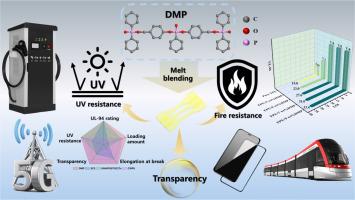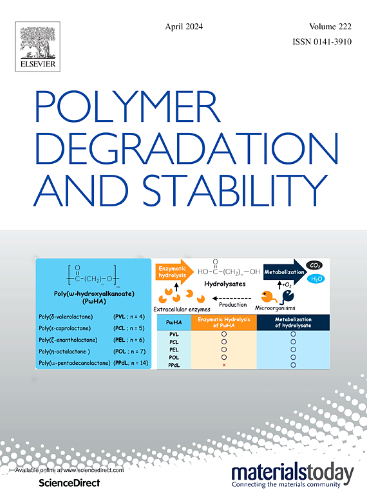制备新型高效芳基膦酸盐阻燃剂,同时提高透明热塑性聚氨酯的防火安全性能和紫外线屏蔽性能
IF 6.3
2区 化学
Q1 POLYMER SCIENCE
引用次数: 0
摘要
热塑性聚氨酯(TPU)具有高易燃性和紫外线老化性,限制了其在新能源和电子设备领域的应用。本研究通过亲核取代反应成功制备了一种新型大分子芳香族膦酸盐双(4-(((二苯基膦酰)氧基)甲基)苯基)苯基膦酸盐(DMP),其中同时含有 P-C 和 P=O。将 DMP 引入热塑性聚氨酯基体中可制备多功能热塑性聚氨酯复合材料。冷凝和气相分析表明,DMP 的阻燃机理主要受阻燃剂抑制和炭层阻隔效应的影响。仅 5 wt% 的 DMP 就能使热塑性聚氨酯达到 UL-94V-0 级,LOI 为 27.6%。与纯热塑性聚氨酯相比,热塑性聚氨酯/5 wt% DMP 的 HRR 和 THR 分别降低了 19.8 % 和 13.2 %。同时,DMP 的熔点与热塑性聚氨酯的加工温度相匹配,增加了其在热塑性聚氨酯基体中的分散性。由于 DMP 与热塑性聚氨酯之间的兼容性极佳,热塑性聚氨酯/DMP 复合材料几乎保持了原有的透明度和延展性。此外,热塑性聚氨酯/DMP 复合材料还具有优异的抗紫外线性能,在紫外线-B 波长下的紫外线屏蔽率为 100%,在紫外线-A 波长下的紫外线隔离率高达 97%。该研究介绍了一种制备多功能阻燃添加剂的新方法,为高性能阻燃热塑性聚氨酯复合材料在轨道交通和电子包装等新兴领域开辟了广阔的应用前景。本文章由计算机程序翻译,如有差异,请以英文原文为准。

Preparation of novel and efficient arylphosphonate flame retardants for simultaneously enhancement of fire safety and UV-shielding properties of transparent thermoplastic polyurethane
Thermoplastic polyurethane (TPU) is highly flammable and UV aging, limiting its application in the field of new energy and electronic device. In this work, a novel macromolecular aromatic phosphonate Bis(4-(((diphenylphosphinyl)oxy)methyl)phenyl)phenylphosphonate (DMP) containing both P-C and P=O was successfully prepared by nucleophilic substitution reaction. The DMP was introduced into the TPU matrix to prepare multifunctional TPU composites. Condensed and gas phase analysis have shown that the flame retardant mechanism of DMP was mainly influenced by flame retardant inhibition and the barrier effect of char layer. Only 5 wt% DMP enabled TPU to obtain the UL-94V-0 rating with the LOI of 27.6 %. Compared with pure TPU, the HRR and THR of TPU/5 wt% DMP were decreased by 19.8 % and 13.2 %. Meanwhile, the matching of the melting point for DMP and the processing temperature for TPU increased its dispersion in TPU matrix. Due to the excellent compatibility between DMP and TPU, TPU/DMP composites almost retained their original transparency and ductility. In addition, TPU/DMP composites exhibited excellent UV resistance, obtaining 100 % UV shielding at UV-B wavelengths and up to 97 % UV isolation at UV-A wavelengths. The study introduced a novel approach for preparing multifunctional flame retardant additives, and opened up wide application prospects for high-performance flame retardant TPU composites in emerging fields such as rail transit and electronic packaging.
求助全文
通过发布文献求助,成功后即可免费获取论文全文。
去求助
来源期刊

Polymer Degradation and Stability
化学-高分子科学
CiteScore
10.10
自引率
10.20%
发文量
325
审稿时长
23 days
期刊介绍:
Polymer Degradation and Stability deals with the degradation reactions and their control which are a major preoccupation of practitioners of the many and diverse aspects of modern polymer technology.
Deteriorative reactions occur during processing, when polymers are subjected to heat, oxygen and mechanical stress, and during the useful life of the materials when oxygen and sunlight are the most important degradative agencies. In more specialised applications, degradation may be induced by high energy radiation, ozone, atmospheric pollutants, mechanical stress, biological action, hydrolysis and many other influences. The mechanisms of these reactions and stabilisation processes must be understood if the technology and application of polymers are to continue to advance. The reporting of investigations of this kind is therefore a major function of this journal.
However there are also new developments in polymer technology in which degradation processes find positive applications. For example, photodegradable plastics are now available, the recycling of polymeric products will become increasingly important, degradation and combustion studies are involved in the definition of the fire hazards which are associated with polymeric materials and the microelectronics industry is vitally dependent upon polymer degradation in the manufacture of its circuitry. Polymer properties may also be improved by processes like curing and grafting, the chemistry of which can be closely related to that which causes physical deterioration in other circumstances.
 求助内容:
求助内容: 应助结果提醒方式:
应助结果提醒方式:


